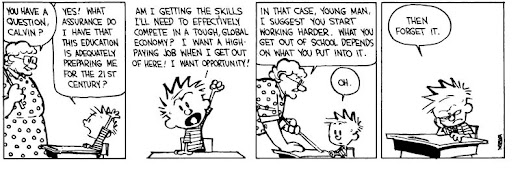HOW TO DO WELL IN SCHOOL
by Danton Remoto
1. Listen to the teacher. When the teacher repeats a point two times,
red flag it and take notes. That means what she is saying is super
important, that is why it is repeated twice, not that she already has
Alzheimer’s (she will, 20 years down the road, after teaching young
people like you).
2. Read everything thrice. The first is to scan the text, like an
eagle surveying the field, before it swoops down for the kill. The
second is to read slowly, marking important points on the margins, or
underlining key words in the text. The third is to summarize the
points in your head, in your notebook, or on the last page of the
text. I tell my students: unless you have summarized the text in three
sentences, in your own words, then you haven’t gotten it right.
3. Master the four skills. Being a teacher of the old school, I tell
my students the four skills of language learning are still important.
The four skills are not surfing the net, texting, watching MTV or
reading classsics.com. The four skills are still reading, writing,
listening and speaking. But because of the four so-called skills I
enumerated earlier, some students no longer want to read. “Eh why pa
did you go to school if you don’t want to read?” I ask my students in
mock horror. Writing well, of course, means reading and rereading The
Elements of Style by William Strunk and E.B. White. Listening, with
the headphones of your iPod off, works best. And speaking, of course.
When one day, I asked a student for his insights into Guy de
Maupassant’s The Jewels, he answered, “Wala lang!” I said, “That is
good. Therefore, your oral recitation grade is also wala lang!” Then
he immediately cobbled together an answer that somewhat mollified his
English teacher.
4. Budget your time. You are a student, right? Therefore, your job is
to study. When I was taking graduate school in the US and we were
reading 600 pages of text every week, I asked my classmates, “How do
we survive this?” “Read the darned pages,” Boho from Harlem said,
“then go to the gym three times a week — and dance in the clubs on
Saturday nights!” And so we did. We read tomes on Islamic Mystical
Literature, the Nineteenth-Century Novel, and Literary Criticism, then
did the treadmill and danced at Splash in New York every Saturday
night. In short, you study hard — and then you play just as hard.
5. Consult with the teacher. Your teacher has placed her e-mail
address and consultation hours in the syllabus. Go and make use of
these. If you get low marks in Composition class, or just cannot get
why the old man Iona Potapov, who has just lost his son, begins
talking to his horse at the end of Chekhov’s story, then talk to the
teacher. With the patience of Job, I am sure he or she will explain
why that sentence is a fragment, and you do not mix your tenses, and
“occasion” is not spelled with two c’s, two s’s, and two n’s, that is
why you got an F. And I am quite sure that your teacher will also
enlighten you on the way Chekhov writes fiction as revelation, where
the unsaid words and the absent gestures are as important — if not
more important — than what is said and shown.



